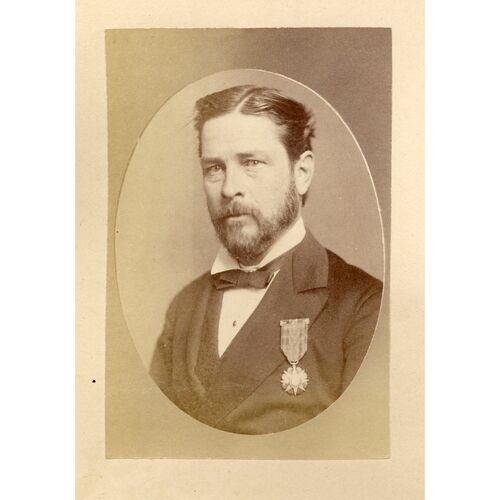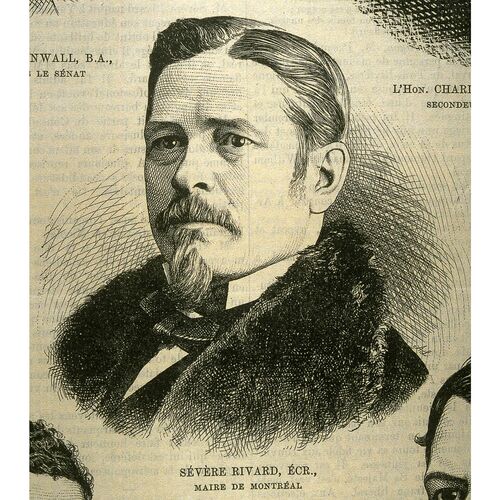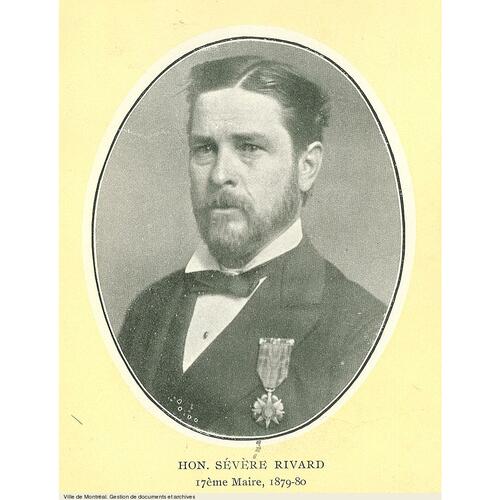RIVARD, SÉVÈRE, lawyer, politician, and businessman; b. 7 Aug. 1834 at Yamachiche, Lower Canada, son of Augustin Rivard-Laglanderie and Marguerite Rivard-Dufresne; m. 1 Aug. 1863 Delphine Choquette in Montreal, Canada East; d. there 4 Feb. 1888.
A descendant of Nicolas Rivard, dit Lavigne, who had settled in the Batiscan region in the 17th century, Sévère Rivard belonged to one of the oldest families in the country. After attending the Séminaire de Nicolet from 1848 to 1856, he studied law in Montreal under Toussaint-Antoine-Rodolphe Laflamme* and Edmund Barnard. He was called to the bar of Lower Canada in 1859 and then went into partnership with his colleague Benjamin-Antoine Testard de Montigny, opening a law office on Rue Saint-Vincent in Montreal.
Rivard began to make himself known in 1867, the year in which he became a secretary, along with Joseph Royal*, of a committee of ten citizens set up to collect the money needed for sending contingents of Canadian Zouaves to Rome to defend the papacy [see Ignace Bourget]. For his efforts he was made a chevalier of Pius IX in 1874. He was a convinced Ultramontane like most of the Canadian Zouaves; moreover in 1871 he participated in one of the preparatory meetings to draft the Programme catholique [see François-Xavier-Anselme Trudel].
An increasingly influential member of the Montreal bourgeoisie, Rivard, in partnership with Ferdinand David, Gustave-Adolphe Drolet, and the architect Michel Laurent, made a large fortune for himself by buying land in the north part of the city at the beginning of the 1870s and reselling it as building lots. In June 1872, with the consent of his partners, he offered Bishop Bourget a gift of land for a church in the village of Saint-Jean-Baptiste (now part of Montreal). Among other ventures, he was involved in a woollen mill at Yamachiche in 1870 and an organ business at Montreal in 1878. In addition, he participated in at least three financial syndicates which attempted during the period from June 1877 to 1881 to obtain control of the Quebec, Montreal, Ottawa and Occidental Railway Company. He went to the universal exposition in Paris in 1878 with his friend Drolet, the Canadian delegate, and both studied ways to develop commercial relations between Canada and Europe. In 1883, with Andrew Allan*, Alexander Walker Ogilvie*, Louis-Adélard Senécal, and Joseph-Rosaire Thibaudeau, among others, Rivard took part in organizing the Citizens’ Gas Company of Montreal, with a subscribed capital of $1,000,000.
Rivard entered municipal politics in Montreal in 1870 with his election as councillor for Saint-Jacques Ward. Having beaten William Crevier by more than 200 votes on that occasion, he was re-elected in 1873 with a majority of 770 over Auguste Robert. He took a particular interest in the problems of the lighting committee, serving as its chairman by 1871; he also supervised the building of a new city hall, as a member of a special committee created for this purpose. Throughout his term on the council he was an acknowledged adversary of the mayor, Jean-Louis Beaudry. Although Beaudry was regarded as invincible, Rivard ousted him from the mayoralty in the 1879 elections, beating him by 290 votes, thanks in particular to the massive support of Saint-Antoine and Sainte-Marie wards (the first with an English-speaking and the second with a French-speaking majority), and despite the weak support from his own ward, Saint-Jacques. In 1880 he was re-elected mayor by acclamation. His mayoralty was distinguished by sustained efforts to put municipal finances on a sound footing after a decade of large-scale projects such as a sewage system, the development of the park on Mount Royal, and the building of the city hall. While continuing work on waterworks and the sanitation system, he succeeded in reducing the municipal debt of $12,000,0000, largely by increasing revenues from $600,000 to $1,500,000. From 1879 to 1881, concurrently with his mayoral duties, Rivard served as a harbour commissioner.
Rivard was a member of the Roman Catholic Board of School Commissioners of the City of Montreal from 16 Aug. 1870 to 29 Nov. 1877, and on 11 Dec. 1881 became a churchwarden of the parish of Notre-Dame for a period of three years. From October 1886 he also represented the division of Alma on the Legislative Council, having succeeded his long-time adversary, Jean-Louis Beaudry, who had recently died. In 1887 he held the post of treasurer of the Conservative party for the Montreal region, a largely honorary office. After being stricken with paralysis, he died on 4 Feb. 1888 in Montreal where he was buried four days later. He left a sizeable fortune, including a house on the corner of Sherbrooke and Saint-Denis, for which the asking price then was $15,000.
AC, Montréal, État civil, Catholiques, Notre-Dame de Montréal, 8 févr. 1888. (It has not been possible to locate a baptismal record for Sévère Rivard.) ANQ-M, État civil, Catholiques, Notre-Dame de Montréal, 1er août 1863. ASN, AP-G, J.-A.-I. Douville, Succession, II: 31; AP-G, M.-G. Proulx, V: 20. AVM, Doc. administratifs, Procès-verbaux du conseil municipal, 1870–73. PAC, MG 30, D1, 26. La Minerve, 6 févr. 1888. CPC, 1887: 239. G. Turcotte, Le Conseil législatif de Québec. Histoire de la corporation de la cité de Montréal depuis son origine jusqu’à nos jours . . . , J.-C. Lamothe et al., édit. (Montréal, 1903). Rumilly, Hist. de Montréal, III: 27, 41, 135–36. Ovila Lefebvre, “M. Sévère Rivard,” La Patrie, 11 juin 1950: 75. Léon Trépanier, “Figures de maires,” Cahiers des Dix, 21 (1956): 179–99.
Cite This Article
Marcel Caya, “RIVARD, SÉVÈRE,” in Dictionary of Canadian Biography, vol. 11, University of Toronto/Université Laval, 2003–, accessed January 2, 2026, https://www.biographi.ca/en/bio/rivard_severe_11E.html.
The citation above shows the format for footnotes and endnotes according to the Chicago manual of style (16th edition). Information to be used in other citation formats:
| Permalink: | https://www.biographi.ca/en/bio/rivard_severe_11E.html |
| Author of Article: | Marcel Caya |
| Title of Article: | RIVARD, SÉVÈRE |
| Publication Name: | Dictionary of Canadian Biography, vol. 11 |
| Publisher: | University of Toronto/Université Laval |
| Year of publication: | 1982 |
| Year of revision: | 1982 |
| Access Date: | January 2, 2026 |


![[Sévère Rivard] [image fixe] / Studio of Inglis Original title: [Sévère Rivard] [image fixe] / Studio of Inglis](/bioimages/w600.5008.jpg)



